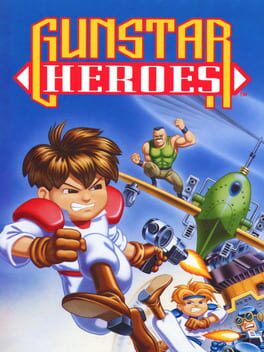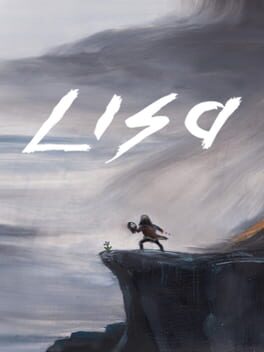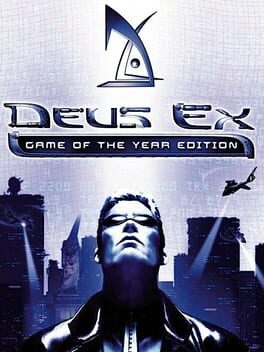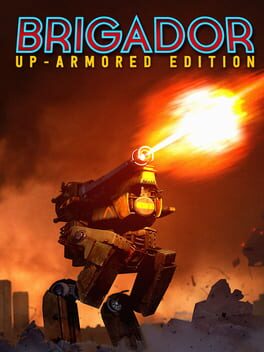ShyGuy014
Bio
Hello, my name is Daulton Nelson. I am an Entry-Level Video Game Developer and Programmer. My favorite video game developer is Treasure, my favorite album is Cornelius's Fantasma, and my favorite movie is Spirited Away. I have a cat too named Gizmo. I love playing and talking about Video Games so much, I've got an entire YouTube channel dedicated. Come visit it sometime: https://youtube.com/user/TheDman214
Hello, my name is Daulton Nelson. I am an Entry-Level Video Game Developer and Programmer. My favorite video game developer is Treasure, my favorite album is Cornelius's Fantasma, and my favorite movie is Spirited Away. I have a cat too named Gizmo. I love playing and talking about Video Games so much, I've got an entire YouTube channel dedicated. Come visit it sometime: https://youtube.com/user/TheDman214
Badges

4 Years of Service
Being part of the Backloggd community for 4 years

GOTY '19
Participated in the 2019 Game of the Year Event

N00b
Played 100+ games

Noticed
Gained 3+ followers

Liked
Gained 10+ total review likes
Favorite Games
145
Total Games Played
000
Played in 2024
144
Games Backloggd
Recently Played See More
Recently Reviewed See More
-----We live in a contemporary world where a virus plagues contemporary life, mistrust of the government plagues contemporary minds, and an age of mis-truth plagues the contemporary internet. It's a modern world that can definitely seem very bleak, and it's one that the seminal video game Deus Ex almost captures frighteningly to a tee back in the year 2000. Deus Ex, developed by the legendary Ion Storm, is not the first immersive sim out there, but it might be the most quintessential and popular one. It's mechanics are standard and its presentation has almost reached meme status in a way. It is a fantastic video game that I've had the pleasure of playing throughout the past month. However, unlike most, I am not head over heels for it.
-----
-----While I definitely appreciate its craft and its relevancy, the gameplay itself never really clicked and I think there are a couple reasons I can explain why. First of all, one of those reasons does not include age. Despite the blocky model fidelity, Deus Ex’s style and attention to detail still holds up to this day. I'd argue its mechanics do as well. For those who don't know, Deus Ex sees you playing as JC Denton, a cyber operative working for FEMA and the American government the help take down domestic terrorists while both try and tackle a new pandemic called the Gray Death.Throughout the game you get to explore various real world locations, as well as locations based off of conspiracy myths. The entire game within itself is kind of cold and dark. It always feels like it's a little paranoid. As for the gameplay, you as the player get to experience these kinds of sandbox like worlds where you get to utilize several different tools in order to complete your objective in almost any way you want to.
-----
-----When I say almost any way you want to, you can either go in guns blazing and kill everybody in your sight, or you can utilize some very weak stealth mechanics to go for a more pacifist run. You can walk around and talk to the world's various NPCs who all have their own little information tidbits or thoughts on what's going on in their world. You can also use things like multi tools and lock picks at your disposal to get into places that otherwise will be closed off to you without a key. It's a neat gameplay loop that I think is enhanced by the almost improvisational manner in which the system's the game developers built are handled. You can absolutely plan your way around these levels, but something is bound to go wrong and you are expected to react to that and some way. I think that's great, especially with the game's save system where you can kind of cheese your way through the game if you really want to by saving at exact moments in time. However I would say that some of the world's sand boxes were better than others for sure.
-----
-----For example, one of my favorite levels was Hong Kong. This city has multiple scenes strung together in a web-like fashion that you can trek across and find different pieces of information and really explore and learn the area enough so that when it gets to its final moments, you really feel like you've learned your way around the place and feel like a master of this environment. The smaller Levels by comparison like the Statue of Liberty at the very beginning of the game I found to be less engaging as a result. While these sandboxes could allow you some freedom and what you could do, I did feel like the game started to fall into a little bit of a loop for me. Maybe it's just how my play style has been tailored throughout the years, but I found myself executing some of the same actions again and again from level to level. I kind of wish the developers through some wrenches in my path which would really force me to think outside the box in these instances . Also on the same topic I did get, in my opinion, a game-breaking weapon in the form of a laser sword around the mid game. This caused me to limit what I did even more just with how effective it was. For some context, the combat in Deus Ex is intentionally clunky which I think is good. I like the fact that Ion Storm tries to make sure that you don't purely go in guns blazing because it's not a reliable method. The problem with that is that once a reliable method is introduced, I think any normal player will latch on to that method. it takes a conscious choice on the player to throw the reliable method like the dragon laser sword away in order to help them explore other options of play. Normally a developer would help this along with things like balances or durability or something like that, but Ion Storm does no such thing with this weapon.
-----
-----Another thing I did really like in Deus Ex were the different augmentations you could get. What augmentations are in Deus Ex are like abilities that you can have attached to a hot bar that you can then access with your function keys. You can get things like a regeneration ability, faster movement, or increased accuracy. I like these a lot, especially the way the progression around these were handled where these upgrade canisters would kind of rarely be put out in the world making each individual gaining of your skills feel all the more rewarding. Speaking of skills, there are Dungeons & Dragons-esc skills that you can spend skill points into to further enhance your abilities. You can put points in categories like lockpicking, computing, weapon tiers, swimming and more. I really like the way this helps you customize your protagonist and customize your play through. While I'm at it, I also really like some of the little things that I don't really see even in modern video games. For example I really like the fact that Deus Ex saves conversations and notes for you to review as you learn things throughout the game. I also like the very grid-based item system that reminds me a lot of games like Resident Evil. Finally, I just really liked how fluid all of these complex systems worked together to make a very simple to understand game despite how much is at your fingertips because at the beginning of the game, Deus Ex can really kind of feel overwhelming at times. But once you learn the systems it's really all natural and how you deal with them and interact with them.
-----
-----Moving on to the story, The Narrative of Deus Ex is what really surprised me the most. I was completely shocked at how dead on a lot of Deus Ex’s themes and subject matter were. I did end up liking the beginning of the game a lot more than the ending of the game. I like the feeling of being a smaller part in a larger world and having very dubious morality lines drawn where it's not necessarily clear who is good over who is bad. I felt like near the end of the game that got kind of taken away for a more traditional approach where there's just kind of one bad guy and you have to stop them. At the end there are still some moral quandaries to help your brain, but I felt like the beginning of Deus Ex just hit a lot better than attending. That being said, the voice acting and the dialogue is absolutely gripping. Deus Ex is so well-written, which is surprising given just how much text is actually here in the game. It seems like at any moment the game could maybe falter once with its conspiracy talk, but it never does. Ion Storm’s game managed to remain interesting throughout.
-----
-----In total, I think Deus Ex is a great game that I'm just not fully appreciating yet. I recognize it's craft and the complex systems that make it one of the best games ever made. However on a personal level I'm kind of failing to connect with it like other games have throughout the years. I recognize the improvisational nature of Deus Ex that makes its gameplay so nail biting, but I just don't feel like the game is strong all the way through nor do I think its balance is all that consistent either. There are general peaks and valleys to the game that I felt like could have been touched up more, but seeing as how much Ion Storm even added to the game in the first place in the year 2000 is nothing short of impressive. Deus Ex is a game that you should absolutely play, despite my reservations. - [07/10]
-----
-----While I definitely appreciate its craft and its relevancy, the gameplay itself never really clicked and I think there are a couple reasons I can explain why. First of all, one of those reasons does not include age. Despite the blocky model fidelity, Deus Ex’s style and attention to detail still holds up to this day. I'd argue its mechanics do as well. For those who don't know, Deus Ex sees you playing as JC Denton, a cyber operative working for FEMA and the American government the help take down domestic terrorists while both try and tackle a new pandemic called the Gray Death.Throughout the game you get to explore various real world locations, as well as locations based off of conspiracy myths. The entire game within itself is kind of cold and dark. It always feels like it's a little paranoid. As for the gameplay, you as the player get to experience these kinds of sandbox like worlds where you get to utilize several different tools in order to complete your objective in almost any way you want to.
-----
-----When I say almost any way you want to, you can either go in guns blazing and kill everybody in your sight, or you can utilize some very weak stealth mechanics to go for a more pacifist run. You can walk around and talk to the world's various NPCs who all have their own little information tidbits or thoughts on what's going on in their world. You can also use things like multi tools and lock picks at your disposal to get into places that otherwise will be closed off to you without a key. It's a neat gameplay loop that I think is enhanced by the almost improvisational manner in which the system's the game developers built are handled. You can absolutely plan your way around these levels, but something is bound to go wrong and you are expected to react to that and some way. I think that's great, especially with the game's save system where you can kind of cheese your way through the game if you really want to by saving at exact moments in time. However I would say that some of the world's sand boxes were better than others for sure.
-----
-----For example, one of my favorite levels was Hong Kong. This city has multiple scenes strung together in a web-like fashion that you can trek across and find different pieces of information and really explore and learn the area enough so that when it gets to its final moments, you really feel like you've learned your way around the place and feel like a master of this environment. The smaller Levels by comparison like the Statue of Liberty at the very beginning of the game I found to be less engaging as a result. While these sandboxes could allow you some freedom and what you could do, I did feel like the game started to fall into a little bit of a loop for me. Maybe it's just how my play style has been tailored throughout the years, but I found myself executing some of the same actions again and again from level to level. I kind of wish the developers through some wrenches in my path which would really force me to think outside the box in these instances . Also on the same topic I did get, in my opinion, a game-breaking weapon in the form of a laser sword around the mid game. This caused me to limit what I did even more just with how effective it was. For some context, the combat in Deus Ex is intentionally clunky which I think is good. I like the fact that Ion Storm tries to make sure that you don't purely go in guns blazing because it's not a reliable method. The problem with that is that once a reliable method is introduced, I think any normal player will latch on to that method. it takes a conscious choice on the player to throw the reliable method like the dragon laser sword away in order to help them explore other options of play. Normally a developer would help this along with things like balances or durability or something like that, but Ion Storm does no such thing with this weapon.
-----
-----Another thing I did really like in Deus Ex were the different augmentations you could get. What augmentations are in Deus Ex are like abilities that you can have attached to a hot bar that you can then access with your function keys. You can get things like a regeneration ability, faster movement, or increased accuracy. I like these a lot, especially the way the progression around these were handled where these upgrade canisters would kind of rarely be put out in the world making each individual gaining of your skills feel all the more rewarding. Speaking of skills, there are Dungeons & Dragons-esc skills that you can spend skill points into to further enhance your abilities. You can put points in categories like lockpicking, computing, weapon tiers, swimming and more. I really like the way this helps you customize your protagonist and customize your play through. While I'm at it, I also really like some of the little things that I don't really see even in modern video games. For example I really like the fact that Deus Ex saves conversations and notes for you to review as you learn things throughout the game. I also like the very grid-based item system that reminds me a lot of games like Resident Evil. Finally, I just really liked how fluid all of these complex systems worked together to make a very simple to understand game despite how much is at your fingertips because at the beginning of the game, Deus Ex can really kind of feel overwhelming at times. But once you learn the systems it's really all natural and how you deal with them and interact with them.
-----
-----Moving on to the story, The Narrative of Deus Ex is what really surprised me the most. I was completely shocked at how dead on a lot of Deus Ex’s themes and subject matter were. I did end up liking the beginning of the game a lot more than the ending of the game. I like the feeling of being a smaller part in a larger world and having very dubious morality lines drawn where it's not necessarily clear who is good over who is bad. I felt like near the end of the game that got kind of taken away for a more traditional approach where there's just kind of one bad guy and you have to stop them. At the end there are still some moral quandaries to help your brain, but I felt like the beginning of Deus Ex just hit a lot better than attending. That being said, the voice acting and the dialogue is absolutely gripping. Deus Ex is so well-written, which is surprising given just how much text is actually here in the game. It seems like at any moment the game could maybe falter once with its conspiracy talk, but it never does. Ion Storm’s game managed to remain interesting throughout.
-----
-----In total, I think Deus Ex is a great game that I'm just not fully appreciating yet. I recognize it's craft and the complex systems that make it one of the best games ever made. However on a personal level I'm kind of failing to connect with it like other games have throughout the years. I recognize the improvisational nature of Deus Ex that makes its gameplay so nail biting, but I just don't feel like the game is strong all the way through nor do I think its balance is all that consistent either. There are general peaks and valleys to the game that I felt like could have been touched up more, but seeing as how much Ion Storm even added to the game in the first place in the year 2000 is nothing short of impressive. Deus Ex is a game that you should absolutely play, despite my reservations. - [07/10]
-----Throughout the 2010’s there were a lot of significant releases for video games. One of those video games that I have always held as deeply significant for me has been The Binding of Isaac: Rebirth. It's a fantastic game that has a lot going for it to this day. So much so that it would be hard to really describe it here. It honestly encompasses a lot of things mechanically and narratively and culturally for video gaming that I could even describe it as the Sgt. Pepper's of the medium. Now, even though The Binding of Isaac had a pretty decent development time with lots of add-ons and DLC attached to it, developer Edmund McMillen kept busy throughout that time. He released many side projects, and participated in a lot of collaborations. Today's important collaboration is with James Interactive who with their help McMillan was able to make The Legend of Bumbo here.
-----
-----The Legend of Bumbo is a neat side project for The Binding of Isaac. Unlike the very action-oriented, shooter gameplay of Isaac, Bumbo takes the guise of a puzzle game and a very familiar one at that. It's a match four puzzler where you slide tiles in order to match different types of icons. During the game you have a set number of moves before your opponent's go on the attack. In this way the gameplay kind of fuses with a JRPG in a sense. It's a game whose gameplay I wasn't very keen on at first. In fact, I wasn't a big fan of this game at all when I initially played it. I found the very slow gameplay kind of frustrating, and the randomness of the tile board didn't add to that.
-----
-----However, once I played more of the game, and allowed myself to dig deeper into the mechanics, I ended up walking away from Bumbo a lot more positively than what I first felt. While I still don't love the game as a whole, I found a lot of things that I think normal players might love with in Bumbo. First, for the types of titles you match a different kind of action will execute. For example, if you match bones or teeth that is your way of attacking enemies. Meanwhile poop and boogers will stifle their progress. Finally there are pee drops that you can match in order to make further returns. There are also wild tiles in the mix as well. Finally the two tiles that I didn't find much use out of, or was kind of unhappy with more than the others were the heart tiles and the cursed tiles. The heart tiles are meant to heal you, but you don't get a lot. I understand why, but when you do actually end up matching Hearts they don't give you a lot in return for the Rarity that they are set as. Meanwhile for the cursed tiles, I don't even know if they even have a use in general. Within my 16 hours of playing the game I never once understood how the cursed tiles could hurt me in any way.
-----
-----In addition to those tiles, you also get Mana every time you match a certain tile type. You can use these to execute spells that can help you out. These spells can range from damaging the enemies in the field to helping you clear your own board in front of you. In classic Isaac fashion as you go through the separate floors of the game you'll be able to acquire more randomly generated spells into your repertoire. there's also these little trinkets as well that can have subtle soft effects on your gameplay. Speaking of both classic Isaac and soft effects, there are also several different character types you can play as throughout Bumbo. Most of them I like. one thing that's soured my first impressions of the game overall was the initial character you get. Well I felt the other characters had very interesting mechanics and systems that you can play around with, the initial main character I didn't care for all that much. Not only that, but it also feels like James interactive and Edmund McMillen are reusing ideas to a certain point with these characters. Especially since it seems like you can unlock the Lost in the game, which given its more random nature than that of Isaac’s, I imagine has got to be extremely excruciating to play eyes. Heck, you have to make sure not to get hit on the first three floors to even unlock him, and I imagine that's got to be left all to chance.
-----
-----However throughout the game there are some interesting enemy types that you can run into. Like Isaac they'll have their own little quirks that you have to learn to deal with as you go along. For example I like the fart clouds and how you couldn't attack through them. It added an extra layer of caution to my game play that I liked. I also like the little exploding flies that if they got too close to you, their death would cause them to explode, which in turn would cause you to lose health. That is an interesting point. One of the mechanics that I'm not necessarily sure if I'm keen on or not is the positioning mechanics of the enemies that you face. In Bumbo, the enemy field is kind of split up like a 3D graph where you have 3 columns, a top layer, a bottom layer, and about 5 rows where the enemies will try and move closer to you as you go forth. Meanwhile whenever you try to attack you can only hit the closest, top most Enemy. Ultimately I think it does add some depth to the gameplay, though it felt a little forced and clunky at times as well. The only time where I felt like this mechanic was utilized especially well was during some of the boss fights. These bosses would use their multiple moves to try to get close to you, which then you in turn would use attacks to push them back. I felt those fights were very smart.
-----
-----Meanwhile the narrative of Bumbo is told in the vignettes that are very similar to Isaac. I do like the intelligent way Bumbo’s story is tied into Isaac, even if I don't care for the narrator behind it. I also like the very diegetic user interface that McMillan and James interactive setup for Bumbo. In fact, as a fan of games like Paper Mario, I really do appreciate the very paper craft, almost childrens’ theater of the entire presentation of Bumbo. I think everything looks great from an aesthetic standpoint. Even McMillan's art, which I feel like he's got such a unique and singular style that sometimes it can become one note at times, still shines through here.
-----
-----Overall, while the legend of Bumbo isn't one of my favorite games I played this year, I had a lot more fun with this addition to Isaac then I thought. That being said, Bumbo still feels like an add-on to the Isaac experience rather than its own kind of standalone enjoyable experience. I thought the puzzle mechanics with depth were interesting enough to carry my playtime all the way to 16 hours. However, the match four gameplay isn't something I'm necessarily a fan of, and there were several elements here that I felt like they were keeping me from enjoying the game as a whole. There are spots in the software that feel really polished and have a lot of care taken into it, and other spots felt like there needed to be more added to it in order to flesh it out even further. Ultimately I would recommend the legend of Bumbo, but only after you've enjoyed a great helping of The Binding of Isaac first. - [06/10]
-----
-----The Legend of Bumbo is a neat side project for The Binding of Isaac. Unlike the very action-oriented, shooter gameplay of Isaac, Bumbo takes the guise of a puzzle game and a very familiar one at that. It's a match four puzzler where you slide tiles in order to match different types of icons. During the game you have a set number of moves before your opponent's go on the attack. In this way the gameplay kind of fuses with a JRPG in a sense. It's a game whose gameplay I wasn't very keen on at first. In fact, I wasn't a big fan of this game at all when I initially played it. I found the very slow gameplay kind of frustrating, and the randomness of the tile board didn't add to that.
-----
-----However, once I played more of the game, and allowed myself to dig deeper into the mechanics, I ended up walking away from Bumbo a lot more positively than what I first felt. While I still don't love the game as a whole, I found a lot of things that I think normal players might love with in Bumbo. First, for the types of titles you match a different kind of action will execute. For example, if you match bones or teeth that is your way of attacking enemies. Meanwhile poop and boogers will stifle their progress. Finally there are pee drops that you can match in order to make further returns. There are also wild tiles in the mix as well. Finally the two tiles that I didn't find much use out of, or was kind of unhappy with more than the others were the heart tiles and the cursed tiles. The heart tiles are meant to heal you, but you don't get a lot. I understand why, but when you do actually end up matching Hearts they don't give you a lot in return for the Rarity that they are set as. Meanwhile for the cursed tiles, I don't even know if they even have a use in general. Within my 16 hours of playing the game I never once understood how the cursed tiles could hurt me in any way.
-----
-----In addition to those tiles, you also get Mana every time you match a certain tile type. You can use these to execute spells that can help you out. These spells can range from damaging the enemies in the field to helping you clear your own board in front of you. In classic Isaac fashion as you go through the separate floors of the game you'll be able to acquire more randomly generated spells into your repertoire. there's also these little trinkets as well that can have subtle soft effects on your gameplay. Speaking of both classic Isaac and soft effects, there are also several different character types you can play as throughout Bumbo. Most of them I like. one thing that's soured my first impressions of the game overall was the initial character you get. Well I felt the other characters had very interesting mechanics and systems that you can play around with, the initial main character I didn't care for all that much. Not only that, but it also feels like James interactive and Edmund McMillen are reusing ideas to a certain point with these characters. Especially since it seems like you can unlock the Lost in the game, which given its more random nature than that of Isaac’s, I imagine has got to be extremely excruciating to play eyes. Heck, you have to make sure not to get hit on the first three floors to even unlock him, and I imagine that's got to be left all to chance.
-----
-----However throughout the game there are some interesting enemy types that you can run into. Like Isaac they'll have their own little quirks that you have to learn to deal with as you go along. For example I like the fart clouds and how you couldn't attack through them. It added an extra layer of caution to my game play that I liked. I also like the little exploding flies that if they got too close to you, their death would cause them to explode, which in turn would cause you to lose health. That is an interesting point. One of the mechanics that I'm not necessarily sure if I'm keen on or not is the positioning mechanics of the enemies that you face. In Bumbo, the enemy field is kind of split up like a 3D graph where you have 3 columns, a top layer, a bottom layer, and about 5 rows where the enemies will try and move closer to you as you go forth. Meanwhile whenever you try to attack you can only hit the closest, top most Enemy. Ultimately I think it does add some depth to the gameplay, though it felt a little forced and clunky at times as well. The only time where I felt like this mechanic was utilized especially well was during some of the boss fights. These bosses would use their multiple moves to try to get close to you, which then you in turn would use attacks to push them back. I felt those fights were very smart.
-----
-----Meanwhile the narrative of Bumbo is told in the vignettes that are very similar to Isaac. I do like the intelligent way Bumbo’s story is tied into Isaac, even if I don't care for the narrator behind it. I also like the very diegetic user interface that McMillan and James interactive setup for Bumbo. In fact, as a fan of games like Paper Mario, I really do appreciate the very paper craft, almost childrens’ theater of the entire presentation of Bumbo. I think everything looks great from an aesthetic standpoint. Even McMillan's art, which I feel like he's got such a unique and singular style that sometimes it can become one note at times, still shines through here.
-----
-----Overall, while the legend of Bumbo isn't one of my favorite games I played this year, I had a lot more fun with this addition to Isaac then I thought. That being said, Bumbo still feels like an add-on to the Isaac experience rather than its own kind of standalone enjoyable experience. I thought the puzzle mechanics with depth were interesting enough to carry my playtime all the way to 16 hours. However, the match four gameplay isn't something I'm necessarily a fan of, and there were several elements here that I felt like they were keeping me from enjoying the game as a whole. There are spots in the software that feel really polished and have a lot of care taken into it, and other spots felt like there needed to be more added to it in order to flesh it out even further. Ultimately I would recommend the legend of Bumbo, but only after you've enjoyed a great helping of The Binding of Isaac first. - [06/10]
Brigador: Up-Armored Edition Review
-----It’s strange when a game doesn’t click with you when you think it really should. That’s what I felt for a majority of my time playing Brigador: Up-Armored Edition. My initial interest for the game was sparked by a MandalorGaming review on Youtube, which gave the software extensive praise. Seeing as the game took obvious ques from the top-down shooter genre, mixed with Rare’s Blast Corps concept, I was really looking forward to this game. Especially with its emphasis on earning money through multiple objectives, I thought the wealth of content with my earned experience would really engage me. Yet throughout my playthrough of Brigador I never felt a decent spark. It’s odd. Especially since I caught glimpses of the aforementioned Blast Corps., but also Hotline Miami, Chopper Attack, Bangai-O, Robotron, and even Binding of Isaac. All games I love, so why not Brigador?
-----
-----One reason I can think of is how dryly the game is presented. I don’t mean the looks. In fact, the neon isometric pixel graphics bathed in saturated vaporwave aesthetics is something to truly admire. The same can be said for the destructible walls and buildings which crush nicely under the treads of Brigador’s well-designed tanks and mechs. No, what I mean is how outside of one moment of theatrics, Brigador doesn’t boast any real explicit narrative moments that would help motivate the player. Instead a lot of Brigador’s story is delivered through text, which isn’t bad on the surface, but when it’s delivered in such a dry and unexciting fashion for the whole game it gets old quickly. It’s not like the narrative is all that interesting either. I’d say Brigador’s story is actually kind of hard to grasp, despite it being kind of cliche within the science fiction genre.
----
---Another reason I’d say I didn’t like Brigador as much as I should have is the pace at which it progresses. Brigador is mission based with marked objectives in each mission needed to complete in order to clear the level. Nothing new, and that’s the way it stays for the entirety of the gameplay. The advent of “kill 70 percent of the enemies” or “destroy these specific targets” gets old really quick. Brigador begs for some sort of shake-up in it’s gameplay that never comes. It also doesn’t help that the difficulty curve of the missions themselves is widely inconsistent, and all the levels are disappointingly short. I’d say there were a few missions in Brigador’s campaign that actually felt satisfying, and most of those came in it’s second third. As for the Freelance mode, forget it. These maps are so spacious and so lacking in enemies that I found this auxillary mode pretty boring. This is especially crushing given how unceremoniously the campaign itself just ends.
-----
-----Finally I’d say that the concept itself is kind of misguided. Brigador works on a firm system of slow tanks and mechs with different weapon types and play styles that are used to tackle swaths of fast enemies who work on an audio-based alarm system. It’s so easy to be overwhelmed to the point of frustration in this game. Trying to pick off enemy groups one by one doesn’t necessarily work either. Helf the time you can’t see the enemy vehicles shrouded in the game’s nighttime levels. Thus shooting at one enemy can result in the unintended consequence of alarming an entire fleet ready to chew through your shield in an instant. I found a good portion of Brigador’s gameplay to just be demoralizing.
------
------Now, with all this being said, I don’t want to poo-poo all over the game outright. I do think there are some great portions of this game worth experiencing. For one, the weapon types and variety is quite well done. The same could be said of the player vehicles. There’s a lot to play around with and learn, and I really liked that. I would also say that when Brigador does work, it works really well. I loved moments when after I fought a big wave of enemies, I stocked up on ammo and shield orbs, and strategically moved onto the next group. And for what it’s worth, there has been a clear level of thought and effort put into the various mechanics and systems put into the game overall. So, overall I would say there are things to love about Brigador. It wouldn’t have had the critical reevaluation by fans over the years as it has without it’s great elements. For me however, I just can’t really get into the game. It’s too dry, too slow, too repetitive, and too hard to grasp for me to really get into it. Disappointing. - [05/10]
-----It’s strange when a game doesn’t click with you when you think it really should. That’s what I felt for a majority of my time playing Brigador: Up-Armored Edition. My initial interest for the game was sparked by a MandalorGaming review on Youtube, which gave the software extensive praise. Seeing as the game took obvious ques from the top-down shooter genre, mixed with Rare’s Blast Corps concept, I was really looking forward to this game. Especially with its emphasis on earning money through multiple objectives, I thought the wealth of content with my earned experience would really engage me. Yet throughout my playthrough of Brigador I never felt a decent spark. It’s odd. Especially since I caught glimpses of the aforementioned Blast Corps., but also Hotline Miami, Chopper Attack, Bangai-O, Robotron, and even Binding of Isaac. All games I love, so why not Brigador?
-----
-----One reason I can think of is how dryly the game is presented. I don’t mean the looks. In fact, the neon isometric pixel graphics bathed in saturated vaporwave aesthetics is something to truly admire. The same can be said for the destructible walls and buildings which crush nicely under the treads of Brigador’s well-designed tanks and mechs. No, what I mean is how outside of one moment of theatrics, Brigador doesn’t boast any real explicit narrative moments that would help motivate the player. Instead a lot of Brigador’s story is delivered through text, which isn’t bad on the surface, but when it’s delivered in such a dry and unexciting fashion for the whole game it gets old quickly. It’s not like the narrative is all that interesting either. I’d say Brigador’s story is actually kind of hard to grasp, despite it being kind of cliche within the science fiction genre.
----
---Another reason I’d say I didn’t like Brigador as much as I should have is the pace at which it progresses. Brigador is mission based with marked objectives in each mission needed to complete in order to clear the level. Nothing new, and that’s the way it stays for the entirety of the gameplay. The advent of “kill 70 percent of the enemies” or “destroy these specific targets” gets old really quick. Brigador begs for some sort of shake-up in it’s gameplay that never comes. It also doesn’t help that the difficulty curve of the missions themselves is widely inconsistent, and all the levels are disappointingly short. I’d say there were a few missions in Brigador’s campaign that actually felt satisfying, and most of those came in it’s second third. As for the Freelance mode, forget it. These maps are so spacious and so lacking in enemies that I found this auxillary mode pretty boring. This is especially crushing given how unceremoniously the campaign itself just ends.
-----
-----Finally I’d say that the concept itself is kind of misguided. Brigador works on a firm system of slow tanks and mechs with different weapon types and play styles that are used to tackle swaths of fast enemies who work on an audio-based alarm system. It’s so easy to be overwhelmed to the point of frustration in this game. Trying to pick off enemy groups one by one doesn’t necessarily work either. Helf the time you can’t see the enemy vehicles shrouded in the game’s nighttime levels. Thus shooting at one enemy can result in the unintended consequence of alarming an entire fleet ready to chew through your shield in an instant. I found a good portion of Brigador’s gameplay to just be demoralizing.
------
------Now, with all this being said, I don’t want to poo-poo all over the game outright. I do think there are some great portions of this game worth experiencing. For one, the weapon types and variety is quite well done. The same could be said of the player vehicles. There’s a lot to play around with and learn, and I really liked that. I would also say that when Brigador does work, it works really well. I loved moments when after I fought a big wave of enemies, I stocked up on ammo and shield orbs, and strategically moved onto the next group. And for what it’s worth, there has been a clear level of thought and effort put into the various mechanics and systems put into the game overall. So, overall I would say there are things to love about Brigador. It wouldn’t have had the critical reevaluation by fans over the years as it has without it’s great elements. For me however, I just can’t really get into the game. It’s too dry, too slow, too repetitive, and too hard to grasp for me to really get into it. Disappointing. - [05/10]











